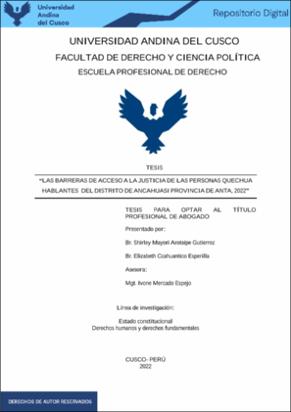| dc.contributor.advisor | Mercado Espejo, Ivonne | |
| dc.contributor.author | Arotaipe Gutierrez, Shirley Mayori | |
| dc.contributor.author | Ccahuantico Esperilla, Elizabeth | |
| dc.date.accessioned | 2023-05-19T14:30:15Z | |
| dc.date.available | 2023-05-19T14:30:15Z | |
| dc.date.issued | 2022-12-26 | |
| dc.identifier.uri | https://hdl.handle.net/20.500.12557/5452 | |
| dc.description.abstract | El estudio tuvo por finalidad: Determinar las barreras de acceso a la justicia de las
personas que tienen como lengua predominante al quechua del distrito de Ancahuasi,
Provincia de Anta, para garantizar el debido proceso. Siendo la investigación de tipo
funcional porque aspira a revelar los obstáculos que afronta la población quechua hablantes
del distrito de Ancahuasi, Provincia de Anta, en sus procesos judiciales y también mostrar el
trato que recibe esta población por parte de las autoridades.
Sigue una línea metodológica en la ruta cualitativa, de tipo investigativo básico,
diseño no experimental y alcance exploratorio. La técnica utilizada fue la entrevista, que, por
medio de la aplicación del instrumento de cuestionario, permitió recolectar toda la
información y datos necesarios para el estudio. El instrumento, se aplicó a defensores
públicos, fiscales, jueces, abogados y comisario del distrito judicial de Ancahuasi; quienes
brindaron toda la información necesaria para dar respuesta al objetivo planteado.
Se concluyó que las barreras determinadas fueron la falta de dominio de la lengua
quechua por parte de los operadores de justicia, pues al ser la comunidad de Ancahuasi una
población campesina, donde la mayor parte de su población hace uso del idioma quechua
para comunicarse, resulta sorprendente que aún las instituciones, como el Ministerio Público,
el Juzgado de Paz Letrado y la Defensoría de Pueblo, no cuenten con el personal adecuado
que garantice y resguarde el acceso a la justicia de los quechua hablantes de este distrito;
vulnerando uno de los derechos procesales que innatamente poseen, como es el debido
proceso. Aunado a ello, no existen traductores en estas instituciones, que permitan la
comprensión de las partes para con el operador de justicia, lo cual es un claro obstáculo para
acceder a la justicia y a la tutela de sus derechos. Entre otras barreras, se encontró la
costumbre, pues al pensar que la justicia nacional no protegerá sus intereses, no recurren a la
administración de justicia propia. | es_PE |
| dc.description.abstract | Abstract
The purpose of the study was: To determine the barriers to access to justice for people
whose predominant language is Quechua in the district of Ancahuasi, Province of Anta, to
guarantee due process. Being the investigation of a functional type because it aspires to
reveal the obstacles faced by the Quechua-speaking population of the district of Ancahuasi,
Province of Anta, in their judicial processes and also to show the treatment that this
population receives by the authorities.
It follows a methodological line of qualitative approach, basic type, non-experimental
design and scope is exploratory. The technique used was the interview, which, through the
application of the questionnaire instrument, allowed collecting all the information and data
necessary for the study. The instrument was applied to public defenders, prosecutors, judges,
lawyers and commissioner of the judicial district of Ancahuasi; who provided us with all the
necessary information to respond to our stated objective.
It was concluded that the barriers determined were the lack of mastery of the Quechua
language on the part of the justice operators, since the community of Ancahuasi is a peasant
population, where the majority of its population uses the Quechua language to communicate,
it results It is surprising that even the institutions, such as the Public Ministry, the Legal
Peace Court and the Ombudsman's Office, do not have adequate personnel to guarantee
access to justice for the Quechua-speakers of this district; violating one of the procedural
rights that they innately possess, such as due process. In addition to this, there are no
translators in these institutions, who allow the parties to understand the justice operator,
which is a clear obstacle to access justice and the protection of their rights. Among other
barriers, custom was found, because thinking that national justice will not protect their
interests, they do not resort to the administration of their own justice. | en_US |
| dc.format | application/pdf | es_PE |
| dc.language.iso | spa | es_PE |
| dc.publisher | Universidad Andina del Cusco | es_PE |
| dc.rights | info:eu-repo/semantics/restrictedAccess | es_PE |
| dc.rights.uri | https://creativecommons.org/licenses/by-nc-nd/4.0/ | es_PE |
| dc.subject | Barreras de justicia | es_PE |
| dc.subject | Quechua hablantes | es_PE |
| dc.title | Las barreras de acceso a la justicia de las personas quechua hablantes del distrito de Ancahuasi provincia de Anta, 2022 | es_PE |
| dc.type | info:eu-repo/semantics/bachelorThesis | es_PE |
| thesis.degree.name | Abogada | es_PE |
| thesis.degree.grantor | Universidad Andina del Cusco. Facultad de Derecho y Ciencia Política | es_PE |
| thesis.degree.discipline | Derecho | es_PE |
| dc.publisher.country | PE | es_PE |
| dc.subject.ocde | https://purl.org/pe-repo/ocde/ford#5.05.00 | es_PE |
| renati.advisor.dni | 23920468 | |
| renati.advisor.orcid | https://orcid.org/0000-0003-2062-9810 | es_PE |
| renati.author.dni | 73687678 | |
| renati.author.dni | 72803778 | |
| renati.discipline | 421016 | es_PE |
| renati.juror | Martiarena Gutierrez, Leoncio | |
| renati.juror | Zúñiga Mojonero, Fredy | |
| renati.juror | Pozo Roldán, Clorinda | |
| renati.juror | Mendoza Delgado, Mauro | |
| renati.level | https://purl.org/pe-repo/renati/level#tituloProfesional | es_PE |
| renati.type | https://purl.org/pe-repo/renati/type#tesis | es_PE |



